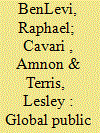| Srl | Item |
| 1 |
ID:
170712


|
|
|
|
|
| Summary/Abstract |
How do publics around the world view Israel? With which side of the Palestinian-Israeli conflict are their sympathies and why? Using Pew survey data from 45 countries we analyse individual-level attitudes towards the two sides to the conflict, testing the influence of security factors, regime types and economic relations, as well as religious identity. We find a large range of attitudes, including high levels of sympathy for both Israel and the Palestinians as well as high levels of neutrality. Religious identity plays the most central role in determining whom to support, whereas economic and security factors are secondary.
|
|
|
|
|
|
|
|
|
|
|
|
|
|
|
|
| 2 |
ID:
099176


|
|
|
|
|
| Publication |
2010.
|
| Summary/Abstract |
The obligations of the 'international community' in the face of humanitarian catastrophe are deeply vexed. In such cases, 'global public opinion' sometimes looks favourably on the use of force to save strangers, also articulated as a global 'responsibility to protect'. For better or worse this view is rarely reflected in decisions of the Security Council. The argument in this article is that the deployment of InterFET in East Timor in September 1999, and events preceding it, showed that humanitarian intervention is a doctrine unlikely to be employed without the consent of the 'target' state. It shows that while decision-makers are influenced by normative concerns, such as the imperative of saving lives, respect for national sovereignty continues to take primacy in an anarchical global society. The processes surrounding coerced consent, such as coalesced in the East Timor case, bear close examination for their potential to influence state behaviour, and thereby assist UN member states to avoid war and save strangers.
|
|
|
|
|
|
|
|
|
|
|
|
|
|
|
|